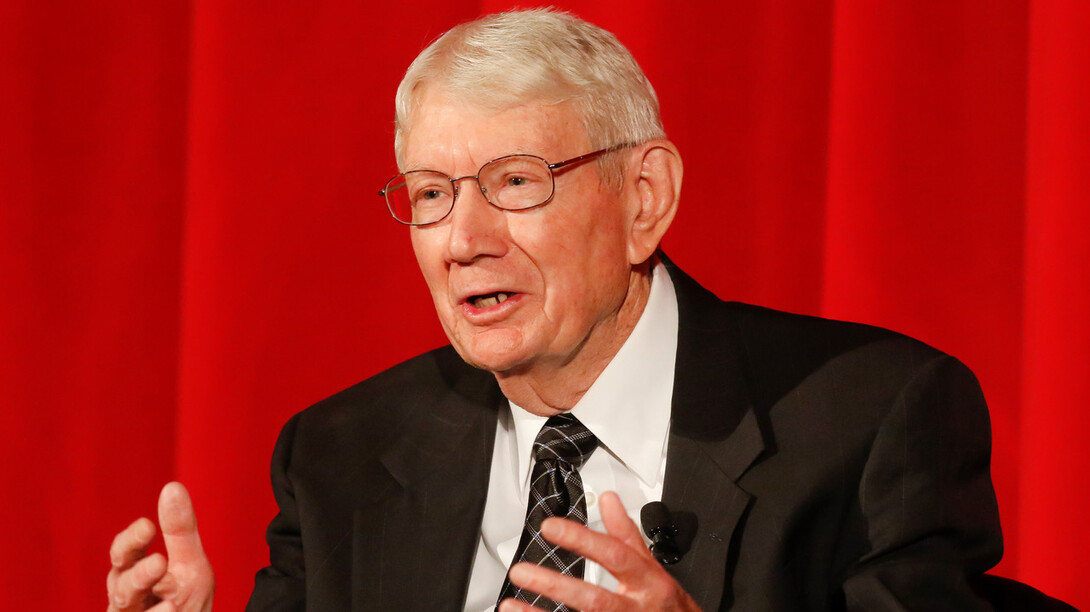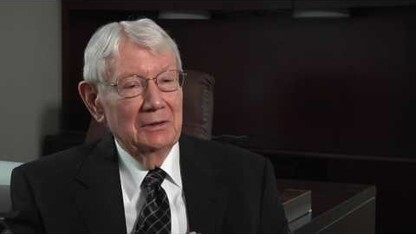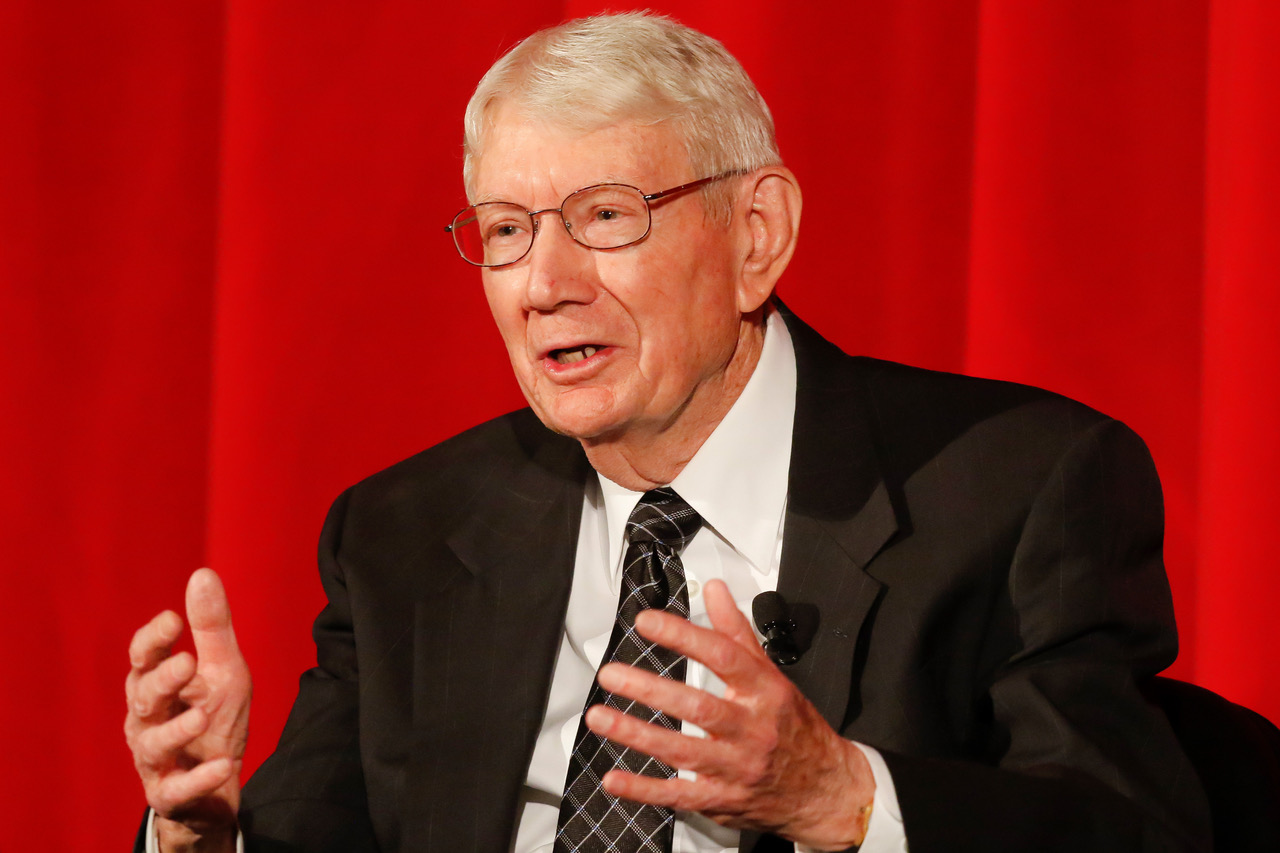
Martin Massengale credits the people of Nebraska for his long and illustrious career at the University of Nebraska. The president and chancellor emeritus and founding director of the Center for Grassland Studies and Foundation Distinguished Professor is beginning his transition into retirement after more than four decades at the university.
“I think Nebraskans as a group are some of the most supportive and dedicated people in the world,” Massengale said. “That is one of the main reasons I have stayed in the state for 40 years. I like the people, and they are there for you when needed.”
Massengale said one of the university’s strengths over the years is how it has served Nebraskans, and they have been unwavering with their support in return. Throughout his career, he has been passionate about developing interdisciplinary approaches that bring groundbreaking research to the people.
“The tripartite mission of the University of Nebraska-Lincoln is critical,” he said. “If you’re going to do research, it needs to be disseminated to the people, and the logical place to conduct that research is where you have faculty members teaching our creative young people and distributing the information.”
A Kentucky native, Massengale grew up on a diversified family farm, which guided his interest in agriculture. In 1952, at 18, he graduated from Western Kentucky University after earning his bachelor’s degree in agriculture. He moved on to the University of Wisconsin, where he was a research assistant while earning his master’s and doctoral degrees in agronomy. Following two years of service with the U.S. Army as a technical adviser, Massengale joined the University of Arizona as an assistant professor of agronomy in 1958. He quickly rose through the ranks of associate professor, professor and agronomy department head before being named associate dean and associate director of the Arizona Agricultural Experiment Station.
In 1976, Massengale came to Nebraska as vice chancellor of the Institute of Agriculture and Natural Resources. He was the second person to take the reins of IANR after it was created by the Nebraska Legislature in 1973.
Massengale became Nebraska’s 16th chancellor in 1981, a post he held for 10 years. When the farm recession of the 1980s hit the economy hard, Massengale had to work closely with administrators, faculty and staff to ensure growth and progress.
“I’m proud that we were able to manage through that time with minimal disruption,” Massengale said. “It’s faculty and staff that make the difference in the university, so it was about keeping their best interests in mind.”
With the recession past, Massengale was able to build on the university’s rising trajectory. Faculty grant funding increased, several facilities were built – including the Lied Center for Performing Arts and the Beadle Center – and the university acquired the Gundmundsen Sandhills Laboratory, resulting in advances in range livestock nutrition, beef cattle reproduction, grazing systems, rangeland ecology, low-cost cattle management, groundwater issues and wildlife management.
Massengale was both interim president of the University of Nebraska and chancellor of the University of Nebraska-Lincoln from August 1989 until his permanent appointment as president in 1991. Under his leadership, Kearney State College moved into the University of Nebraska system, becoming the University of Nebraska at Kearney. Massengale was president until 1994, when faculty approached him with an idea. Recognizing the importance of the livestock industry to the state, they wanted to organize a hub that would integrate research, teaching and service for livestock and feed production associated with the beef cattle industry.
“The faculty who came up with the idea for the Center for Grassland Studies were forward thinkers and were able to foresee where the university could make an important contribution to the state through the livestock industry,” Massengale said.
The Center for Grassland Studies was formed within IANR in 1994, with Massengale serving as founding director. The center’s mission is to implement focused, interdisciplinary research, educational and service programs and activities that emphasize the role of grasslands as a natural resource and conservation measure to enhance the efficiency, profitability, sustainability and aesthetic value of grasslands, wetlands and turfs.
“I think the center has a unique spot within the university because it takes a holistic and multi-disciplinary approach to problem-solving,” Massengale said.
Massengale is the author or co-author of more than 70 scientific papers and has been a consultant to governments, agencies and universities in 14 countries. He has chaired and led many groups and organizations and is a fellow of the American Association for the Advancement of Science, American Society of Agronomy and the Crop Science Society of America.
A public retirement reception for Massengale will be 3 to 5 p.m. March 28 at the International Quilt Study Center and Museum, 1523 N. 33rd St.
In retirement, Massengale plans to finish some projects for the university, serve on nonprofit boards and volunteer.
Steven Waller, dean of the College of Agricultural Sciences and Natural Resources, will provide administrative oversight for the Center for Grassland Studies until June 30, when he steps down as dean. He will assume the role of interim director of the Center for Grassland Studies on July 1.









